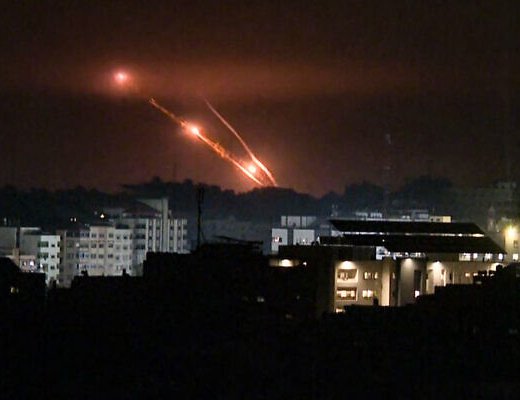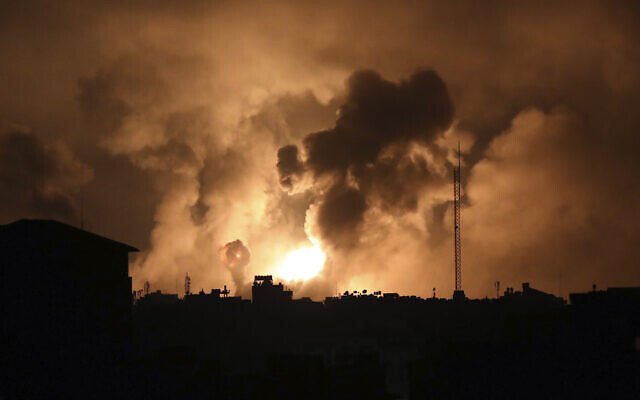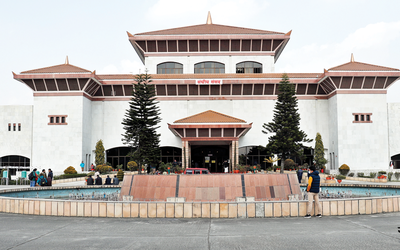
Internet, phone services collapse in Strip amid intensified operations, which officials stress are not full-scale offensive; Washington says it’s not ‘drawing red lines’ for Israel
The Israeli military ramped up airstrikes in the Gaza Strip on Friday night and said it was expanding ground operations into the coastal enclave following several nights of limited raids.
Internet and phone services were down across Gaza amid reports by Palestinians that Israeli ground forces including tanks were operating within the Strip and heavy exchanges of gunfire could be heard.
“The Air Force is striking underground targets very significantly,” said IDF Spokesman Rear Adm. Daniel Hagari.
Explosions caused by Israeli airstrikes in the northern Gaza Strip, October 27, 2023. (AP/Abed Khaled)
The Israeli military ramped up airstrikes in the Gaza Strip on Friday night and said it was expanding ground operations into the coastal enclave following several nights of limited raids.
Internet and phone services were down across Gaza amid reports by Palestinians that Israeli ground forces including tanks were operating within the Strip and heavy exchanges of gunfire could be heard.
“The Air Force is striking underground targets very significantly,” said IDF Spokesman Rear Adm. Daniel Hagari.
“In addition to the attacks that we carried out in recent days, ground forces are expanding their activity this evening. The IDF is acting with great force … to achieve the objectives of the war.”
For the last two days, IDF infantry forces and tanks have conducted limited operations in the Gaza Strip.
Hagari said the IDF will continue to strike Gaza City and surrounding areas in northern Gaza, and renewed his call for Palestinians to evacuate to the Strip’s south.
“We are prepared to defend in all arenas. We are acting in order to protect the security interests of the State of Israel,” he said.
The Hamas terror group’s military wing, the Izz ad-Din al-Qassam Brigades, said it was confronting Israeli forces in Gaza and that “violent clashes” were taking place near Beit Hanoun in the northern part of the Palestinian enclave, and Bureij in the center.
US and Israeli officials told ABC News that the Israeli ground incursion in Gaza was not the expected large-scale offensive Israel has been threatening for three weeks — aimed to dismantle Hamas following its devastating October 7 onslaught into Israel. On that Saturday morning, some 2,500 terrorists streamed into Israel by land, sea, and air, killing over 1,400 people, a majority of them civilians in their homes and at an outdoor music festival in border communities across southern Israel. Hamas and allied terrorist factions also dragged over 220 hostages — including some 30 children — into the Gaza Strip where they remain captive.
An unnamed American source told ABC that the operation Friday was another limited one. And IDF spokesman Peter Lerner said the activity was not the major operation that has been expected since the devastating terror assault.
On Friday night, White House National Security spokesman John Kirby repeatedly refused to comment on the expanded activities, and said Washington would not draw “red lines” for Israel.
“We’re not drawing red lines for Israel,” Kirby said Friday on a call with reporters. “We’re going to continue to support them” but “since the very beginning we have, and will continue to have, conversations about the manner that they are doing this.”
Defense Minister Yoav Gallant told a small group of foreign reporters earlier that Israel expects a long and difficult ground offensive into Gaza soon. It “will take a long time” to dismantle Hamas’ vast network of tunnels, he said, adding that he expected a lengthy phase of lower-intensity fighting as Israel destroys “pockets of resistance.”
Hamas had earlier called on world countries to “act immediately” to stop Israel’s response to its October 7 massacre.
On Friday evening, terrorists in Gaza launched a series of rocket barrages into Israel, targeting southern and central Israeli cities. A foreign worker was moderately wounded after a rocket landed in agricultural land near Rishon Lezion, according to medics.

In Sderot, a pair of rockets fired from Gaza slammed into a home and an outdoor shelter. Some damage was caused but no one was harmed.
Gazan terrorists have launched thousands of rockets at Israel since October 7, killing and wounding dozens, and sending hundreds of thousands running for shelter, and the education of hundreds of thousands of children disrupted as schools remain shut or in a limited format.
The Israeli military on Friday night revealed that Hamas was using Gaza City’s Shifa Hospital as a main base of operations, providing visuals and intercepted audio as evidence of the terror organization’s activities.
Hagari said Israel has intelligence that there are several tunnels leading to the underground base from outside the hospital so that Hamas officials do not need to enter the hospital to reach it. But Hagari added that there is also an entrance to the underground complex from within one of the wards.
Hagari also said Israel has “concrete evidence” that “hundreds of terrorists flooded into the hospital to hide” following the October 7 terror onslaught.
Hamas’s internal security also has a command center inside Shifa Hospital, from which it directs rocket fire on Israel and stores weapons, he added.
- South Korean Truth Commission Halts Probe Into Adoption Fraud
- Apr 25, 2025
- PM Modi and US Vice President Vance welcome progress in India-US Bilateral Trade Agreement
- Apr 22, 2025
- Pope Francis dies at 88, Vatican says
- Apr 22, 2025
- Iran, US to continue talks for nuclear deal
- Apr 20, 2025
- Putin announces Easter ceasefire in Ukraine
- Apr 20, 2025














